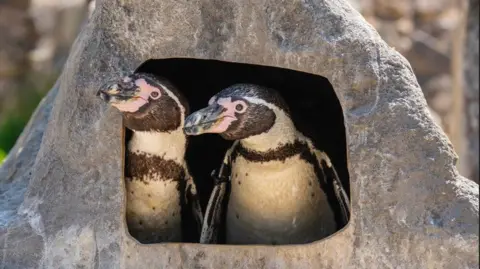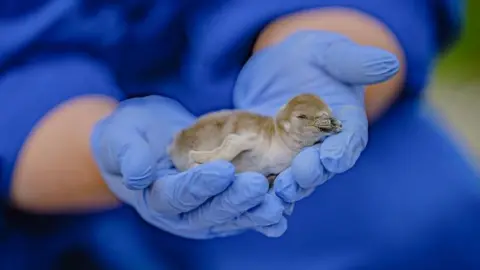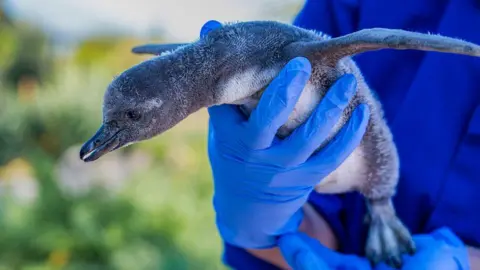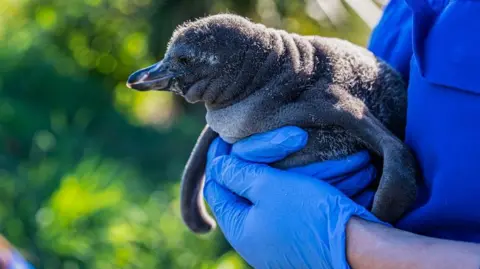Same-sex penguin couple hatch rare chick at zoo
 Chester Zoo
Chester ZooA rare chick has been hatched and raised by a same-sex penguin couple at Chester Zoo.
The Humboldt chick is one of 10 to have hatched at the zoo, in what it described as a "bumper year for penguins".
Scampi and Flounder, a pair of male penguins, "stepped in to help raise one of two eggs laid by another penguin pair, Wotsit and Peach", the zoo said.
The chicks are said to now be days away from taking to the water for the first time.
Bird experts at the zoo carefully shared the eggs between the two nests to help give both chicks the best possible start and to help improve the chances of successful fledging.
The Humboldt is the most threatened of all 17 species of penguin.
 Chester Zoo
Chester ZooChester Zoo's penguin team manager, Zoe Sweetman, said: "It's fantastic news for the species and a brilliant success for the international conservation breeding programme.
"The fluffy new arrivals are all being looked after brilliantly by their parents, having nearly quadrupled in size since they first emerged."
The zoo spokesperson said penguin couples shared feeding and parenting duties, and this was supplemented by extra fish provided by the keepers.
The adult penguins swallow this, blending it into a protein-rich soup before regurgitating it to feed the chicks.
 Chester Zoo
Chester ZooEight of the chicks, who live in the zoo's Penguin Island habitat, have been named Ursa, Alcyone, Quasar, Orion, Dorado, Cassiopeia, Altair and Xena after constellations and celestial wonders.
The other two are to be named in a public vote via social media.
 Chester Zoo
Chester ZooHumboldt penguin facts
- This South American penguin is named after the chilly Humboldt current, along which the penguins commonly swim
- Humboldt penguins are social animals, living in relatively large colonies of closely spaced burrows
- Humboldt penguins travel through the water at speeds of up to 25mph
- They enjoy a diet of small fish, such as anchovies, herring and smelt and crustaceans
- They are classed as vulnerable to extinction by the International Union for the Conservation of Nature (IUCN)
- In the wild, Humboldt penguins are vulnerable to disturbances in their food chain caused by strong El Niño currents, which happen when surface waters in the eastern and central tropical Pacific Ocean become unusually warm
Read more stories from Cheshire on the BBC, watch BBC North West Tonight on BBC iPlayer and follow BBC North West on X. You can also send story ideas via Whatsapp to 0808 100 2230.
